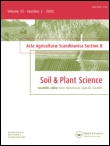
ACTA AGRICULTURAE SCANDINAVICA SECTION B-SOIL AND PLANT SCIENCE
Scope & Guideline
Cultivating Knowledge for a Sustainable Agricultural Future
Introduction
Aims and Scopes
- Soil and Plant Interactions:
Research on the relationships between soil characteristics and plant growth, including nutrient availability, soil structure, and microbial communities. - Sustainable Agricultural Practices:
Exploration of methods and practices that promote sustainable agriculture, including organic farming, integrated pest management, and conservation agriculture. - Crop Improvement and Management:
Studies aimed at improving crop yield and quality through genetic, agronomic, and management practices, including breeding and biotechnological approaches. - Environmental Impact Assessment:
Assessment of the environmental effects of agricultural practices, including greenhouse gas emissions, soil degradation, and biodiversity impacts. - Food Security and Resilience:
Research focusing on enhancing food security through improved agricultural practices and resilience to climate change and other stresses.
Trending and Emerging
- Soil Carbon Sequestration:
Research on soil carbon dynamics and strategies for enhancing carbon sequestration in agricultural soils has gained momentum, aligning with global efforts to mitigate climate change. - Biochar and Organic Amendments:
There is growing interest in the use of biochar and other organic amendments to improve soil fertility and health, as well as to reduce greenhouse gas emissions. - Precision Agriculture Technologies:
Emerging studies focus on the application of precision agriculture technologies, such as remote sensing and data analytics, to optimize resource use and enhance crop management. - Plant-Microbe Interactions:
Research exploring the interactions between plants and soil microorganisms, including beneficial microbes that enhance plant growth and resilience, is increasingly prominent. - Climate Change Adaptation Strategies:
Emerging themes include adaptation strategies for agriculture in response to climate change, focusing on resilient crop varieties and sustainable land management practices.
Declining or Waning
- Traditional Crop Protection Methods:
There has been a noticeable decline in studies focused on conventional pesticide use and traditional crop protection methods, as the agricultural community increasingly shifts towards integrated pest management and organic practices. - Monoculture Practices:
Research on monoculture systems has decreased as the focus has shifted towards agroecological practices and diversification strategies that enhance soil health and resilience. - Chemical Fertiliser Dependence:
There is a waning interest in studies that advocate for heavy reliance on chemical fertilizers, as more research is now directed towards organic amendments and sustainable nutrient management strategies.
Similar Journals

Revista de Agricultura Neotropical
Cultivating Knowledge for Sustainable AgricultureRevista de Agricultura Neotropical, published by UNIV ESTADUAL MATO GROSSO SUL, serves as a pivotal platform for disseminating research in the fields of agronomy and crop science. Since its inception as an open-access journal in 2014, it has been dedicated to promoting innovative research and practical applications within the agricultural sector, specifically tailored to the challenges and dynamics of the tropical agriculture landscape in Brazil and beyond. Although currently positioned in the Q4 quartile of Scopus rankings, and with a modest agricultural science percentile, the journal actively encourages contributions that highlight sustainable agricultural practices, tropical crop management, and emerging technologies in farming. With its commitment to open access, the Revista de Agricultura Neotropical broadens the reach of critical knowledge, making it accessible to researchers, professionals, and students alike, thus fostering a collaborative environment for advancing agri-scientific initiatives.

Revista Ciencia Agronomica
Empowering innovation in agronomy and beyond.Revista Ciencia Agronomica is a leading open access journal published by the Universidade Federal do Ceará, Departamento de Geociências, dedicated to advancing the field of agricultural sciences. Established in 2008, the journal has emerged as a significant platform for the dissemination of original research and innovative advancements in areas including agronomy, horticulture, and soil science, with a dedicated convergence of years extending to 2025. With an impactful presence in academic circles—ranking in Q3 for Agronomy and Crop Science and Soil Science and Q2 for Horticulture in 2023—this journal provides vital insights for researchers and practitioners alike. Although specific HIndex metrics are currently unavailable, the journal's Scopus rankings attest to its relevance, placing it in the 52nd, 44th, and 43rd percentiles across multiple pertinent categories. Since transitioning to an open access model in 2010, Revista Ciencia Agronomica has committed to maximizing the reach and impact of its published work, thereby ensuring valuable contributions to global agricultural knowledge.

Zemdirbyste-Agriculture
Fostering global discourse on food security and environmental health.Zemdirbyste-Agriculture is a prominent journal dedicated to advancing the field of agricultural sciences, with a particular focus on agronomy and crop science. Published by the Lithuanian Research Centre Agriculture & Forestry, this open access journal has been fostering knowledge sharing and scientific discourse since 2004, allowing researchers, professionals, and students unrestricted access to its content. Located in the beautiful country of Lithuania, specifically at Vytautas Magnus University, this journal plays a significant role in disseminating innovative research findings. With a 2023 Scopus ranking of #246 out of 406 in the category of Agricultural and Biological Sciences, Zemdirbyste-Agriculture falls within the Q3 quartile, reflecting its growing influence in the academic community. This journal, which has converged its publication focus from 2008 to 2023, aims to provide a platform for scientists to share their critical insights on agricultural practices, sustainability, and technological advancements in crop science, thereby contributing to the global discourse on food security and environmental health.
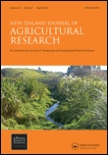
NEW ZEALAND JOURNAL OF AGRICULTURAL RESEARCH
Cultivating Knowledge in Soil and Crop ManagementNEW ZEALAND JOURNAL OF AGRICULTURAL RESEARCH is a prestigious, peer-reviewed journal published by Taylor & Francis Ltd that has been at the forefront of agricultural science since its inception in 1958. With a strong focus on the fields of Agronomy and Crop Science, Animal Science and Zoology, Plant Science, and Soil Science, this journal has established itself in the academic community, achieving a notable Q2 ranking in various agricultural categories as of 2023. The journal thrives on its commitment to disseminating cutting-edge research and innovative practices that address contemporary challenges in agriculture. Although it does not currently offer an open access option, its valuable contributions can be accessed through various academic platforms, ensuring that vital research reaches a wide audience of researchers, professionals, and students globally. The journal's continued relevance and authority are reflected in its strong Scopus rankings, further emphasizing its role as a critical journal within the agricultural sciences.
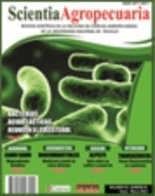
Scientia Agropecuaria
Advancing agricultural knowledge for a sustainable future.Scientia Agropecuaria, an esteemed journal published by the Universidad Nacional de Trujillo’s Faculty of Agricultural Sciences, is dedicated to advancing research in the fields of Agronomy, Animal Science, and Soil Science. With a rich heritage since its inception, the journal has embraced Open Access since 2010, ensuring global dissemination of knowledge to researchers and practitioners. Hailing from Trujillo, Peru, it plays a vital role in the scientific community, capturing a Q3 ranking across multiple categories in the 2023 category quartiles, which reflects its growing influence, supported by its commendable Scopus percentile rankings. The scope of the journal is to publish original research, reviews, and insights that address critical issues and innovations in agriculture and related fields, making it a key resource for researchers, professionals, and students aiming to stay abreast of cutting-edge developments. As the journal continues its convergence until 2024, it remains an important platform for impactful contributions to the agricultural sciences.

Frontiers in Agronomy
Leading the Charge in Agronomic ExcellenceFrontiers in Agronomy, published by FRONTIERS MEDIA SA, is a premier open-access journal dedicated to the dynamic field of agronomy. Launched in 2019, it has rapidly established itself as a leader in the publication of groundbreaking research, holding a distinguished Q1 ranking in several categories including Agricultural and Biological Sciences, Agronomy and Crop Science, Plant Science, and Soil Science as of 2023. With an impressive Scopus ranking that positions it among the top journals in its field, this journal provides a valuable platform for researchers, professionals, and students alike to disseminate and access innovative research and critical insights in agronomy. Every contribution to Frontiers in Agronomy undergoes rigorous peer review, ensuring that high-quality research remains at its core. Accessible to all since its inception, it serves as a vital resource for advancing knowledge and fostering collaboration within the global agronomic community, supporting the quest for sustainable agricultural practices and enhanced crop productivity.
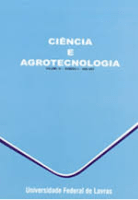
CIENCIA E AGROTECNOLOGIA
Advancing Agricultural Innovation for a Sustainable FutureCIENCIA E AGROTECNOLOGIA, published by UNIV FEDERAL LAVRAS-UFLA, is a vital open-access journal since 2005 that serves as an influential platform for disseminating research in the fields of Agronomy, Animal Science, Food Science, Soil Science, and Veterinary Science. With its ISSN 1413-7054 and E-ISSN 1981-1829, this journal is recognized for its contribution to science and technology advancements in agriculture, particularly in Brazil, fostering knowledge exchange among researchers, professionals, and students. Currently ranked in the Q2 quartile for Agronomy and Crop Science, Animal Science and Zoology, and in the Q3 quartile for Food Science and Soil Science, it demonstrates a solid international standing in the relevant Scopus indices. The journal's commitment to open access ensures that critical research findings are freely available, enabling a broader impact and encouraging collaborative advancements in agritech. As the journal looks towards its converged years from 2007 to 2024, it continues to uphold its objectives of promoting sustainable practices and innovation within the agricultural sciences.

AGROCHIMICA
Advancing agricultural knowledge for a sustainable future.AGROCHIMICA is an eminent journal published by PISA UNIV PRESS, dedicated to advancing the fields of Agronomy, Crop Science, Food Science, and Soil Science. With a rich history dating back to its inception in 1973, this journal has evolved through various phases of publication, illustrating its commitment to delivering quality research over several decades. Although currently categorized in the Q4 quartile across its respective disciplines, AGROCHIMICA provides a platform for foundational and innovative studies that contribute to knowledge in agricultural practices and sustainable food systems. While the journal is not open access, it remains a valuable resource for researchers, professionals, and students interested in Italy's and the global agricultural landscape, fostering a greater understanding of the complexities within these interconnected fields. The ISSN associated with this journal is 0002-1857, and it is published from Pisa, Italy, addressing the evolving challenges in agriculture with a spotlight on rigorous scientific inquiry.

INDIAN JOURNAL OF AGRICULTURAL SCIENCES
Cultivating knowledge for a thriving agricultural community.Welcome to the Indian Journal of Agricultural Sciences, a vital resource for researchers and professionals in the field of agricultural sciences, published by the esteemed Indian Council of Agricultural Research. Established in 1974, this journal aims to disseminate high-quality research and developments in agronomy and crop science, facilitating knowledge exchange and advancement within the agricultural community. Though currently classified in the Q4 category according to 2023 data, it provides an essential platform for publication, contributing valuable insights towards sustainable agricultural practices. With an ISSN of 0019-5022 and an E-ISSN of 2394-3319, the journal houses important research that spans decades of convergence and collaboration, promoting innovation in agriculture across India and beyond. As an open access platform, it invites contributions that reflect a wide array of agricultural disciplines to foster sustainable food systems that address the challenges of food security. Join the network of scholars and practitioners by sharing your research and engaging with the profound work being done in this transformative field.
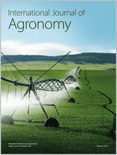
International Journal of Agronomy
Empowering Agronomy Through Open Access InsightsIntroducing the International Journal of Agronomy, an influential publication in the field of agricultural sciences, established by HINDAWI LTD. With an impact factor that reflects its relevance and quality, this journal has been an essential resource for researchers and professionals since its shift to Open Access in 2009, facilitating widespread dissemination of knowledge. Based in the United States, the journal has achieved notable recognition within the academic community, currently ranked in the Q2 quartile among Agronomy and Crop Science, with an impressive Scopus Rank of #139 out of 406 in its category, representing the top 65th percentile. Spanning from 2013 to 2024, it aims to advance the understanding and innovation in agronomy through its rigorous peer-reviewed research articles, reviews, and case studies. With a commitment to enhancing global agricultural practices and sustainability, the International Journal of Agronomy stands as a vital platform for sharing cutting-edge findings that ultimately contribute to the advancement of the agronomic sciences.